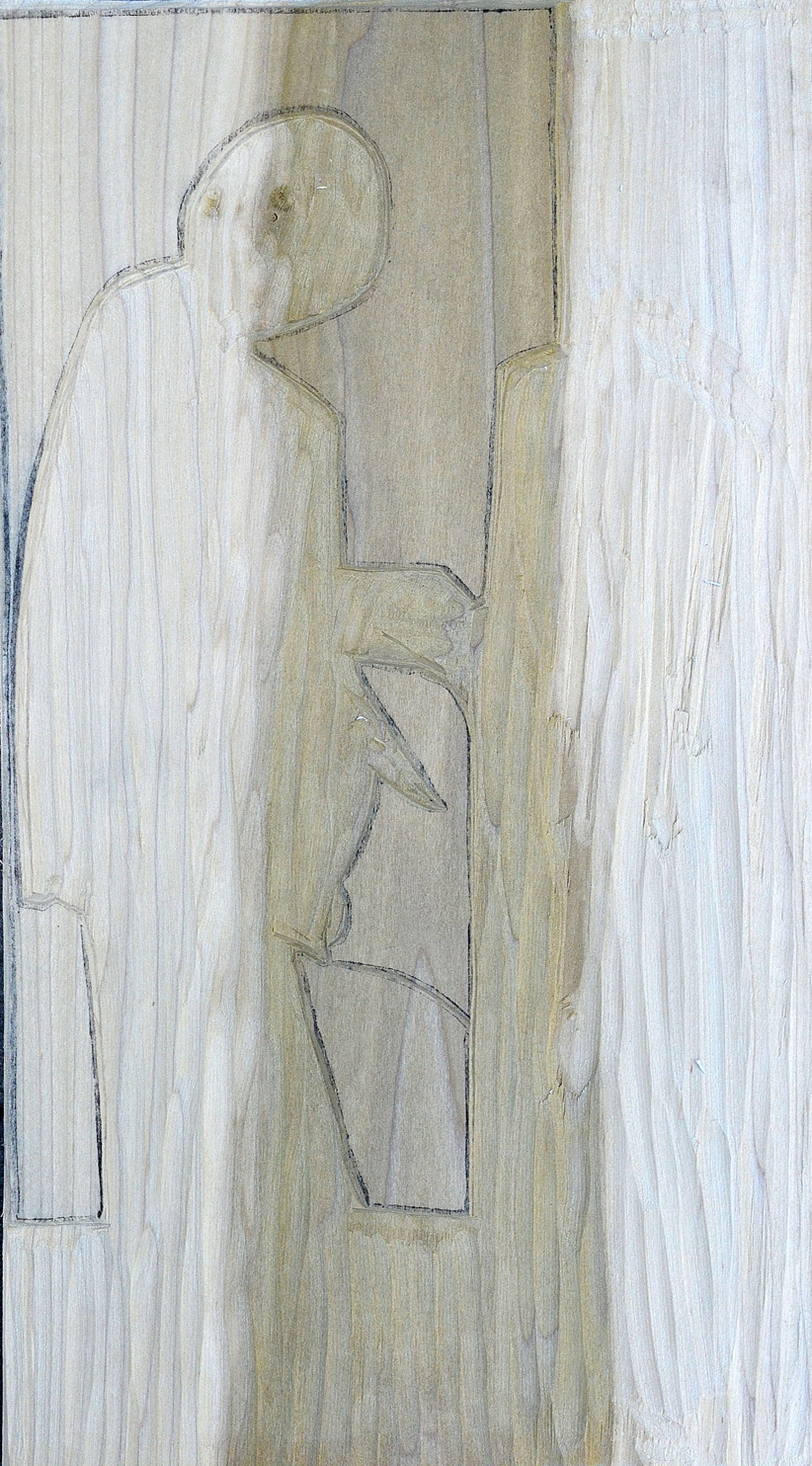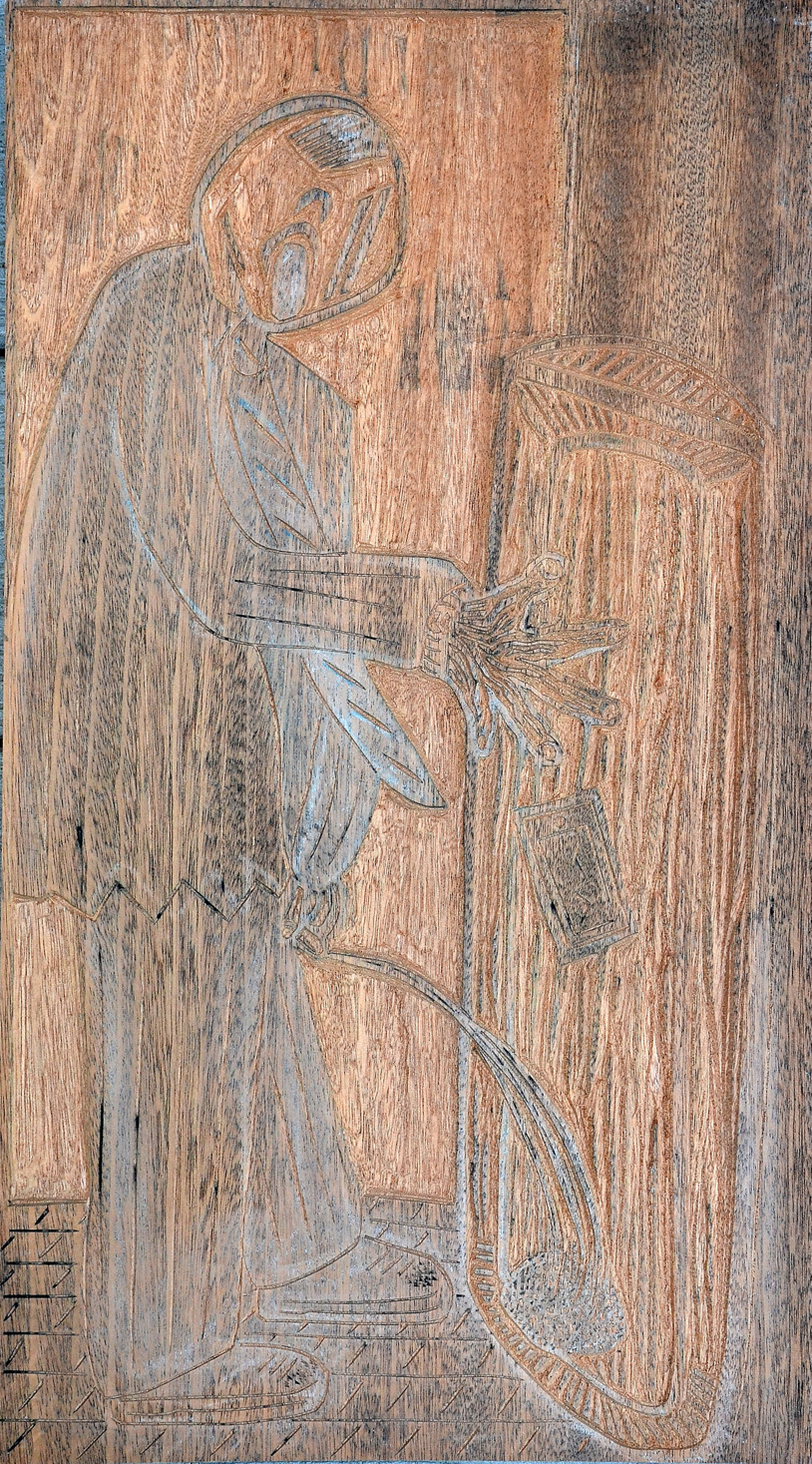Korporate Culture - Woodcut Exhibit
Korporate Culture - Woodcuts
April 18th to May 30, 2017
Edward Williams Gallery - Petrocelli College
Fairleigh Dickenson University
150 Kotte Place, Hackensack, NJ 07601
Reception Saturday April 22nd 2-4PM
Gallery Hours: Weekdays: 8:30 am to 8:30 pm
Saturdays: 9:30 am to 2:30 pm
Diana Soorikian, Director: 201-692-2449
Around the world with Korporate Culture
Korporate Culture has been spotted around the world! No matter how you try, you can't escape....
Here in New York:
On Broadway
All the way out in Perth, Australia
Havana!!
In Sydney
In Auckland
San Francisco
Artist: Viola Frey
Korporate Culture is everywhere for you to embrace
"My life ended when I dropped my cell phone in the urinal" The CEO
On the job
Two Woodcut Plates
At the Studio - Layout print on Mylar,Get pressure of press
A corporate worker applies the the yellow ink to the first block
Now inking up the black plate
The print comes off the press
Workplace Disaster in Yellow - Color Woodcut
Korporate Culture is Live
How are Korporate Culture Woodcuts made?
How are Korporate Culture woodcuts made?
The first step is inspiration… It starts with an experience or seeing something that brings to mind the image. Many of you have had a Boss in your face and experienced some work related humiliation. Lets look at the woodcut “In His Face” which was sketched in October 2015, carved in April 2016 and Printed in May 2016. Below is the sketch.
In His Face - Sketch with litho crayon October 2015
Next step was to have the image on the wall for a while (about 5 months) in between workdays to determine how it should look as a woodcut and really think about the feeling of having that Boss in your face… What wood to use? What size? What colors? What paper to Print on?
The look should be strong lines with some intense grain and a bold white contrasting against pink and black. The color intensifies the feeling of humiliation. Mahogany wood was used for the main image to create the grain and Poplar was used to create even color. The wood blocks were cut the same size (18” X 12”). Two blocks had to be made, one for the main image:
In His Face - Black Block Mahogony wood 18 X 12" April 2016
In His Face - Black Block Detail to see grain
And another wood block for the color image:
In His Face - Color Block - Poplar wood - April 2016 - (Notice that the grey piece had to be cut away so it could be inked properly)
The image is drawn on the main block with water-based crayons so it can be easily changed prior to carving. The image is backwards to what you will see when printed, just like looking in a mirror. The blocks were carved mostly with an electric Japanese tool but some parts were done with hand tools as well.
Woodcut Tools
Once the first image was carved, the second one had to be created so that it would register with the first one. The first block was printed with water-based ink, and then the image was transferred to the second block by rubbing the paper face down with the wet ink on top of the second block. The second block could now be carved to add the color. Because the color was too close to ink up between the red tie and grey part of the jacket, part of the block was sawed off. When going through the press you ink it separately and then put the block together like a jigsaw puzzle.
Proofs are made of the image with water-based ink and hand rubbing tools as seen below. In between proofs more carving is done. Once the image looks right, its time to print through the press.
In His Face - Proof with water based ink and hand rubbed - April 2016
One morning in May 2016 the blocks went to the press located in New York City. The press has a flat bed where the woodcut lies on a registration pattern. French Rives BFK Western paper and Yatsuo Asian Rice Paper were chosen to try different paper qualities with the image. When the press is cranked with the paper on top of the woodcut, it rolls under a large drum. There were two printers and a master printer that worked the press. The blocks were inked up with oil based ink and run through the press two times: first for the color and then for the black. The image had to be registered so that the color would be in the right spot. About 10 prints in total were created. Because they are not completely similar or on the same paper, this is not an edition but rather a proofing of the image. An edition where there are a set amount of prints that are on a similar paper would come later when proofs are sold.




























